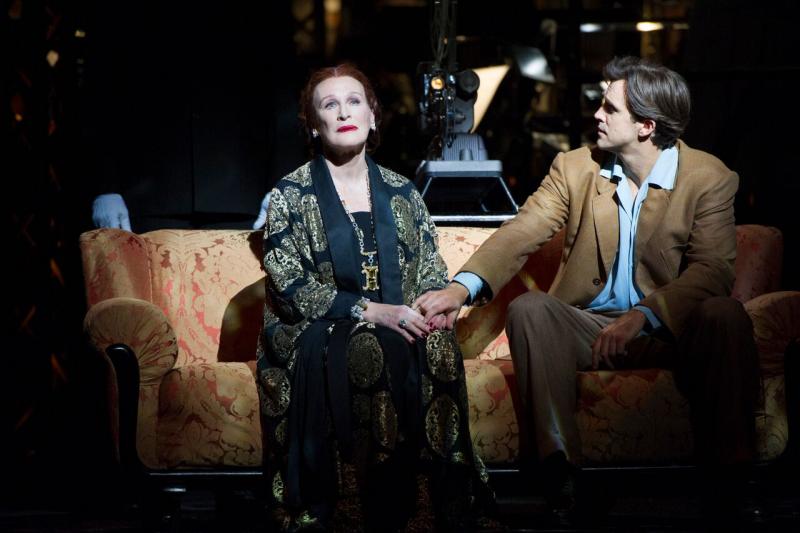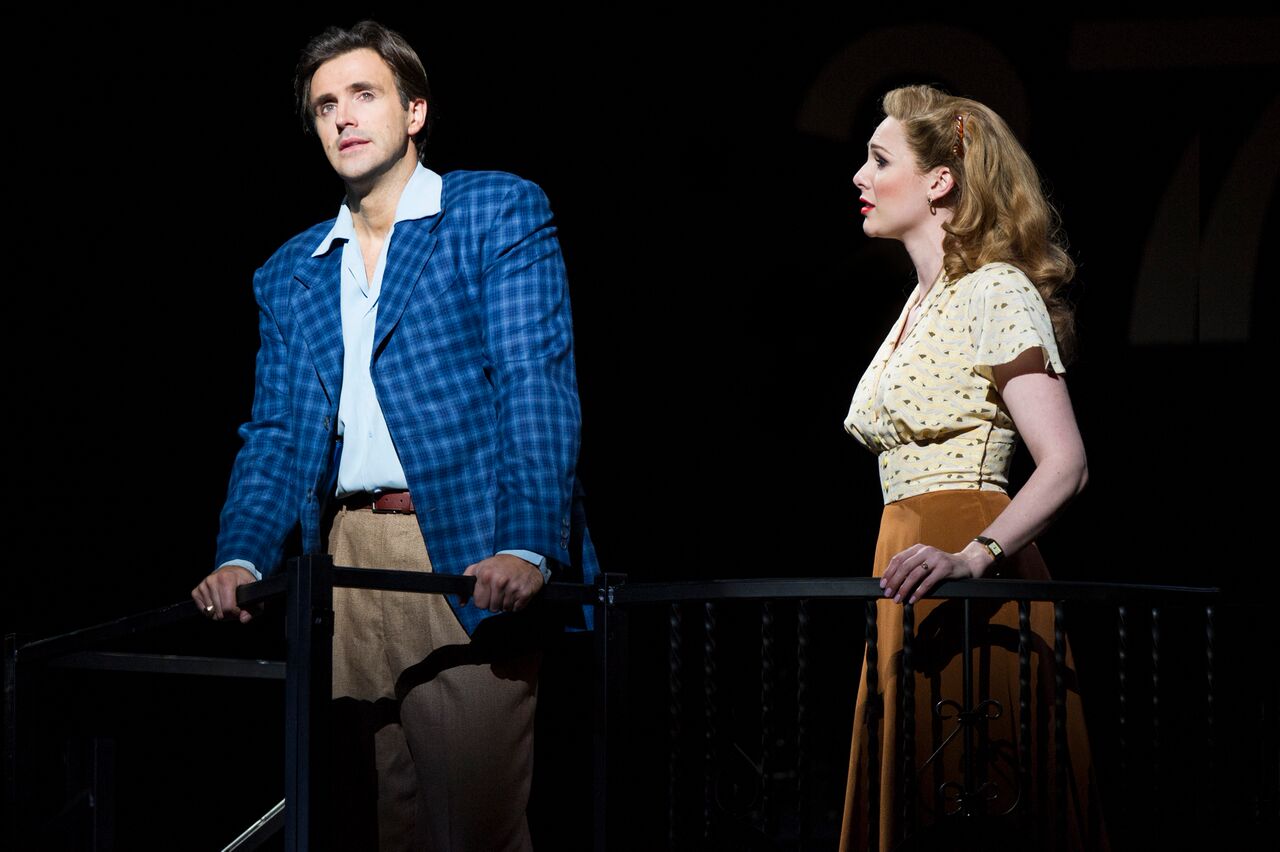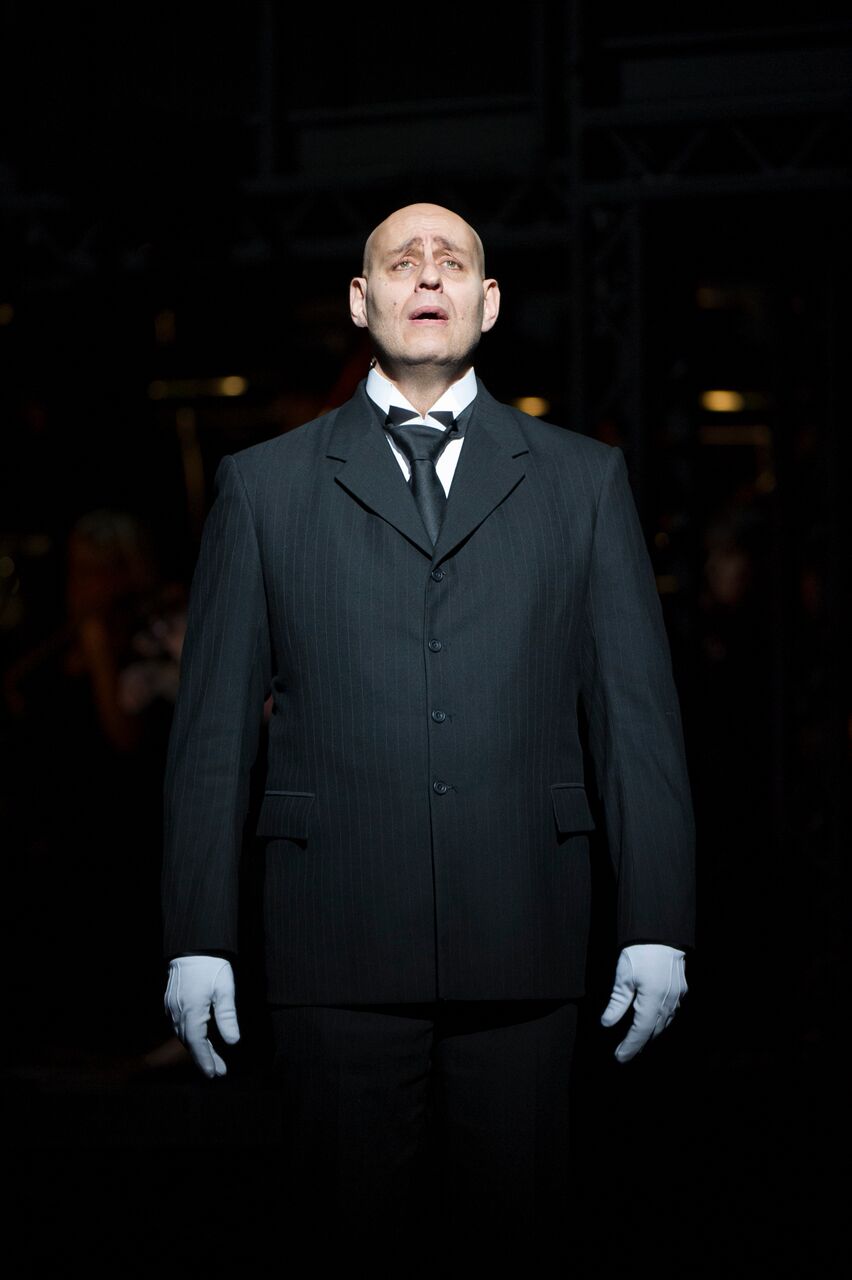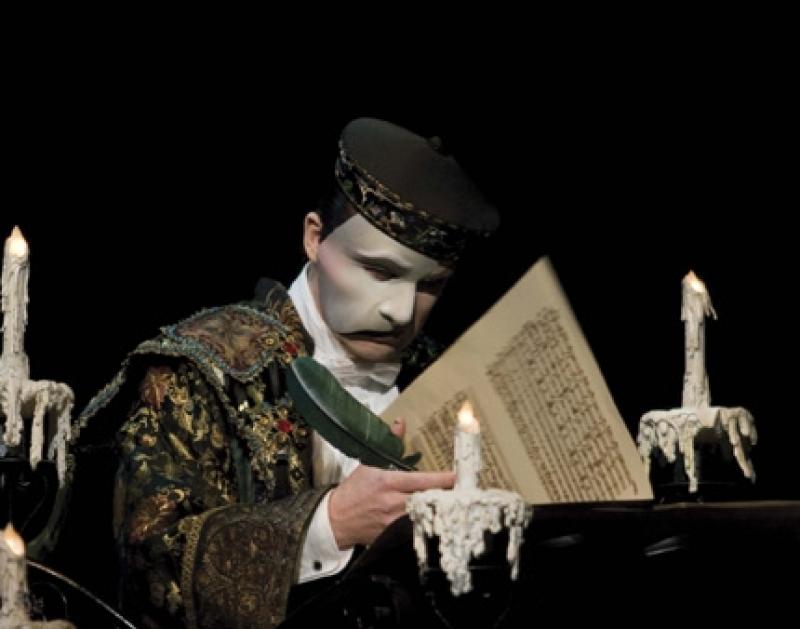Sunset Boulevard, London Coliseum | reviews, news & interviews
Sunset Boulevard, London Coliseum
Sunset Boulevard, London Coliseum
Glenn Close and company do much to fill Lloyd Webber's half-empty vessel

Could the fascination of Glenn Close's Norma Desmond transcend the frequent bathos of Lloyd Webber? Would they have sorted out the miking which wrecked last year's first choice of semi-ENO musical, the infinitely superior Sweeney Todd? Yes, to varying degrees.
Still, give a diva her due. There's little doubt that if Billy Wilder had been around to make his masterly film of Sunset Boulevard in 2016 with Glenn Close, rather than in 1951 with Gloria Swanson, we'd still be raving about the choice of actress. That Close can go from tender to psychotic in a second we know from another of her great screen creations, the brilliant-terrifying lawyer Patty Hewes in the many series of Damages, an infinitely more nuanced character.
 The problem with the musical as opposed to screen Norma Desmond is that she has to sing, a lot. That's not to suggest that over 20 years on from her Tony Award-winning Broadway triumph – adding another layer of fascination to the passing-time theme – Close has lost any of the powerful chest voice needed for the role (for all I know, it may be even stronger). It's just that her first two signature numbers are simple-banal, with Lloyd Webber immediately failing to sustain the aura of an eerie gulf between past and present so necessary for the role (what would Sondheim have done here? "Liaisons" from A Little Night Music may give a hint).
The problem with the musical as opposed to screen Norma Desmond is that she has to sing, a lot. That's not to suggest that over 20 years on from her Tony Award-winning Broadway triumph – adding another layer of fascination to the passing-time theme – Close has lost any of the powerful chest voice needed for the role (for all I know, it may be even stronger). It's just that her first two signature numbers are simple-banal, with Lloyd Webber immediately failing to sustain the aura of an eerie gulf between past and present so necessary for the role (what would Sondheim have done here? "Liaisons" from A Little Night Music may give a hint).
Later there's more delicacy, even a whiff of pathos, in "This Time Next Year". Not to mention a smattering of effective numbers throughout: Lloyd Webber is always best when pastiching tangos and congas, or sounding dangerously – but hardly ever quite, except in four Puccini chords – like somebody else; the peppy real-world script number that runs like so much else throughout is a hairsbreadth away from the music of the insouciant Wreck in Bernstein's Wonderful Town. The real problem is his setting of the not very distinguished lyrics by Don Black and Christopher Hampton – the spoken text is fine, fairly faithful to the film – with mis-stresses that Wagner's mastersinger-critic Beckmesser would delight in marking down on his slate (too many to mention, but "her masterpiece can never pall" stood out with two horrors in a row).
 The noirish opening certainly benefits from widescreen orchestral sound – coming from centre stage, clearly well conducted by Michael Reed but a little flattened by unavoidable amplification – and Lloyd Webber sustains it to support flagging scriptwriter Joe Gillis's angry "Sunset Boulevard" number at the start of Act Two. You can either see the continuity as through-composed music theatre or repetition to cover flagging inspiration; it's surely a bit of both.
The noirish opening certainly benefits from widescreen orchestral sound – coming from centre stage, clearly well conducted by Michael Reed but a little flattened by unavoidable amplification – and Lloyd Webber sustains it to support flagging scriptwriter Joe Gillis's angry "Sunset Boulevard" number at the start of Act Two. You can either see the continuity as through-composed music theatre or repetition to cover flagging inspiration; it's surely a bit of both.
Michael Xavier delivers what's asked of him as the unsympathetic Gillis; as bright young studio thing Betty Schaefer, Siobhan Dillon does sweet and dependable well, especially in the potentially anodyne love duet (pictured above). Fred Johanson has powerful presence – with just a touch of the Boris Karloffs – and bass-baritone resonance for the ache of Norma's protector/butler Max von Meyerling (pictured below).
 The ENO Chorus lamented that they were messed around in first being required for the production, then not; but it's hard to see how they could have handled the show-singer cameos of the 14-strong ensemble. All are good and make the most of the limited space left over from orchestra and walkways in James Noone's set designs. But they and choreographer Stephen Mear do have to handle two of the worst "light relief" numbers in any show, for tailors and beauticians respectively.
The ENO Chorus lamented that they were messed around in first being required for the production, then not; but it's hard to see how they could have handled the show-singer cameos of the 14-strong ensemble. All are good and make the most of the limited space left over from orchestra and walkways in James Noone's set designs. But they and choreographer Stephen Mear do have to handle two of the worst "light relief" numbers in any show, for tailors and beauticians respectively.
Not everything in Lonny Price's economical staging works: the "young Norma" figure is so weak as barely to register, and the pocket version of a car journey down Sunset Boulevard doesn't quite make the innovative grade. Despite Mark Henderson's lighting showering gold on the recluse's mansion rooms, the spookiness of Norma's environment doesn't hold and the tension lapses in the second act.
Again you can't fault Close; her final mad scene, in which she looks not so much like Salome as Joan Sutherland dolled up for the role of Massenet's Princess Esclarmonde, is a bit anticlimatic in terms of what Lloyd Webber gives her. "Rose's Turn" it isn't; though Close has different qualities to put her up there with Imelda Staunton – expect her this time next year to take the same Olivier award Staunton has just walked away with – Sunset Boulevard has nothing like the characterising skills which make Gypsy a great musical. So it's an efficient evening rather than an involving one; but Lloyd Webber enthusiasts should be well satisfied.
ANDREW LLOYD WEBBER'S BACK CATALOGUE
Aspects of Love. Chamber-sized Trevor Nunn revival misses Michael Ball
Cats. The danciest British musical ever is back
Evita. Operatic revival lacks satirical bite, but is elevated by a star turn
 Jesus Christ Superstar. A classic musical reborn for a contemporary audience
Jesus Christ Superstar. A classic musical reborn for a contemporary audience
Love Never Dies. The bad and the beautiful do battle in Phantom sequel
School of Rock: The Musical. Andrew Lloyd Webber's transatlantic transfer is a blast
The Beautiful Game. Spirited revival of football musical set in the Troubles
The Phantom of the Opera. Does the most successful entertainment event of all time still have it?
PLUS ONE TURKEY
Stephen Ward. A seedy misfire tells the story of the Profumo scandal
rating
Share this article
Add comment
The future of Arts Journalism
You can stop theartsdesk.com closing!
We urgently need financing to survive. Our fundraising drive has thus far raised £49,000 but we need to reach £100,000 or we will be forced to close. Please contribute here: https://gofund.me/c3f6033d
And if you can forward this information to anyone who might assist, we’d be grateful.

Subscribe to theartsdesk.com
Thank you for continuing to read our work on theartsdesk.com. For unlimited access to every article in its entirety, including our archive of more than 15,000 pieces, we're asking for £5 per month or £40 per year. We feel it's a very good deal, and hope you do too.
To take a subscription now simply click here.
And if you're looking for that extra gift for a friend or family member, why not treat them to a theartsdesk.com gift subscription?
more Theatre
 Till the Stars Come Down, Theatre Royal Haymarket review - a family hilariously and tragically at war
Beth Steel makes a stirring West End debut with her poignant play for today
Till the Stars Come Down, Theatre Royal Haymarket review - a family hilariously and tragically at war
Beth Steel makes a stirring West End debut with her poignant play for today
 Nye, National Theatre review - Michael Sheen's full-blooded Bevan returns to the Olivier
Revisiting Tim Price's dream-set account of the founder of the health service
Nye, National Theatre review - Michael Sheen's full-blooded Bevan returns to the Olivier
Revisiting Tim Price's dream-set account of the founder of the health service
 Girl From The North Country, Old Vic review - Dylan's songs fail to lift the mood
Fragmented, cliched story rescued by tremendous acting, singing and music
Girl From The North Country, Old Vic review - Dylan's songs fail to lift the mood
Fragmented, cliched story rescued by tremendous acting, singing and music
 The Merry Wives of Windsor, Shakespeare's Globe review - hedonistic fizz for a summer's evening
Emma Pallant and Katherine Pearce are formidable opponents to Falstaff's buffoonery
The Merry Wives of Windsor, Shakespeare's Globe review - hedonistic fizz for a summer's evening
Emma Pallant and Katherine Pearce are formidable opponents to Falstaff's buffoonery
 Run Sister Run, Arcola Theatre review - emphatic emotions, overwrought production
Chloë Moss’s latest play about the different lives of two sisters is deeply felt
Run Sister Run, Arcola Theatre review - emphatic emotions, overwrought production
Chloë Moss’s latest play about the different lives of two sisters is deeply felt
 Intimate Apparel, Donmar Warehouse review - stirring story of Black survival in 1905 New York
An early Lynn Nottage work gets a superb cast and production
Intimate Apparel, Donmar Warehouse review - stirring story of Black survival in 1905 New York
An early Lynn Nottage work gets a superb cast and production
 Hercules, Theatre Royal Drury Lane review - new Disney stage musical is no 'Lion King'
Big West End crowdpleaser lacks punch and poignancy with join-the-dots plotting and cookie-cutter characters
Hercules, Theatre Royal Drury Lane review - new Disney stage musical is no 'Lion King'
Big West End crowdpleaser lacks punch and poignancy with join-the-dots plotting and cookie-cutter characters
 Showmanism, Hampstead Theatre review - lip-synced investigation of words, theatricality and performance
Technically accomplished production with Dickie Beau never settles into a coherent whole
Showmanism, Hampstead Theatre review - lip-synced investigation of words, theatricality and performance
Technically accomplished production with Dickie Beau never settles into a coherent whole
 4.48 Psychosis, Royal Court review - powerful but déjà vu
Sarah Kane’s groundbreaking play gets a nostalgic anniversary reboot
4.48 Psychosis, Royal Court review - powerful but déjà vu
Sarah Kane’s groundbreaking play gets a nostalgic anniversary reboot
 Joyceana around Bloomsday, Dublin review - flawless adaptations of great dramatic writing
Chapters and scenes from 'Ulysses', 'Dubliners' and a children’s story vividly done
Joyceana around Bloomsday, Dublin review - flawless adaptations of great dramatic writing
Chapters and scenes from 'Ulysses', 'Dubliners' and a children’s story vividly done
 Stereophonic, Duke of York's Theatre review - rich slice of creative life delivered by a 1970s rock band
David Adjmi's clever and compelling hit play gets a crack London cast
Stereophonic, Duke of York's Theatre review - rich slice of creative life delivered by a 1970s rock band
David Adjmi's clever and compelling hit play gets a crack London cast

Comments
Always hilarious reading
Always hilarious reading Lloyd Webber reviews written by Sondheim fanboys. "What would Sondheim have done here?" asks Mr Nice. He'd have slapped in the same old notes he has used his entire career and probably some of those hackneyed cringe-inducing lyrics he specialises in.
Mamma mia, che spocchia
Mamma mia, che spocchia insopportabile.
I found the show pretty dull
I found the show pretty dull and uninspiring. Glenn Close hit all the right notes but (to paraphrase Morecambe & Wise) not always in the right order. The music is repetitive and derivative; the libretto is banal. The amplification was immensely intrusive and badly done - this is one occasion when surtitles were essential if one was to hear what was being sung and said - but maybe not being able to hear much of the dialogue was a benefit. Only Fred Johanson and the marvellous ENO orchestra were up to scratch. Needless to say, the undiscerning audience of Lloyd Webberites were up on their feet. Let's hope the profits help ENO to survive the savage Arts Council cuts.